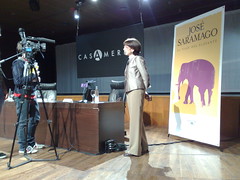â??To Pilar, Who Did Not Let Me Dieâ?
 Â
Â
Jose Saramago, 1998 Nobel Literature prize winner, has presented his last nobel, â??The Elephantâ??s Journey,â? the book which is crowned with the following dedication: â??To Pilar, who did not let me die.â? From his presentation in Madrid, twelve to thirteen thesis could come alive. One could write about life, death, illness, dignity, happiness. And also about humor, travel, literature and so much more. The things that accompany Saramago.
â??It is thousands of kilometers to reach Viena from Lisboa, just because of a kingâ??s caprice, and what does the elephant have to do with any of this?â? -asks Saramago while speaking of the argument.
â??I noticed -he affirms- that this has to do with the human condition, which does not know very well the reasons of its path.â?
The elephant existed and so did his journey, but Saramagoâ??s novels, nurtures and changes it forever:Â â??What has taken me to write this book is not the journey, but the end.â? Â Because, what happens here after death? While one is alive, we know what is happening. But what happens after death?
The elephantâ??s journey is an epic one. The tale has nothing to do with the illness itself, -as he cleared today-. But he has an end, and that end â??is not to arrive well,â? but what happens there, after he has left. The indignity that has been practiced against the animal by cutting its legs and convert them into umbrellas for the ladies of a palace in Vienna.
â??the author makes us reflect about the feeling of liberty, about the powerful and the humble, about random luck. And, from his pessimism, he tries to demonstrate that the world hasnâ??t changed much since the sixteenth century,» -â??The Nationâ? said today that there are not many pieces left of true history, but Saramago has respected two. The nature of the elephants journey and an anecdote. There is an instant where the elephant is crossing the streets of Vienna and a four year old girl runs towards him. People fear that she will be stumped to death. But no. The elephant picks her up with its trumpet and raises her into the air:
â??I am sure that if this had not happened, I would have never been able to invent something as serious, because even literature has its normsâ? -was said this morning. Saramago has pinpoint that the illness had nothing to do with the book. Even though he was reluctant when Pilar del Tio interviewed him.
His translator and partner, has spoken of the same chapter that, a person looses itself in the middle of darkness, and surrounded by danger. Suddenly he hears the trumpet that guides him through the darkness and saves his life. The translator, -since translators tend to be the best readers, -asks, was the book the trumpet that contributed to saving your life? -Could be, – answered Saramago.

In any case, the illness, says the Novel, assumed â??a type of earthquake that brought to the surface sediments of antique linguisticsâ? that has taken him to use words and expressions from other eras.
What does one loose if he is not lost? Has also been asked. I think -he has answered- that we have all been lost at some point. What makes the journey is the conscience that we have of the trip.





